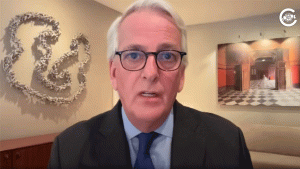Town Hall with Ivo Daalder on Russia-Ukraine Crisis
About This Event
The world is watching as Russia’s aggression against Ukraine rises at an alarming speed. As events unfold in Eastern Europe, members of the public were invited to discuss the situation directly with Council President and former US Ambassador to NATO Ivo Daalder. Daalder’s shared his thoughts on how the crisis is playing out, and answered questions on what the future may hold for NATO, the EU, and broader global security strategies.
"Putin may seem 10 feet tall… but he isn't. We ought to have a little bit more confidence in our capabilities."
Transcript of Ivo Daalder's KEY Remarks AND Q&A Following Russia's Invasion of Ukraine
This transcript has been edited for length and clarity purposes. Watch the entirety of the public town hall discussion.
Questioner: I’ve been following Gary Kasparov and one of the things he's been saying is that we need to rearm Ukraine as much as possible right now. How do we do that if Russia controls the airspace – especially if you're saying that [Russia] will gain control over the entire country within a few days?
Ivo Daalder: So, we won't be able to rearm the Ukrainians with the kind of capabilities that would stave off or let alone defeat a Russian invasion. We must accept the reality for geography reasons, frankly, as well as for just balance of power reasons. The Russians are going to be far superior in their ability to take on Ukraine… and sending them things like patriot missiles are complicated to operate… You need to train people and with training means that you need large numbers of troops on the territory of Ukraine, and we decided not to do that. Again, history will debate whether that was the right decision, but for now that was the decision.
The kind of armaments and the kind of military support that I think we need to provide is first intelligence. We have better intelligence than anybody else and we just proved it because we knew exactly what the Russians were going to do, and we had their battle plans. We knew when, how, what, and everything else. We need to share that intelligence, not just at a strategic level but at a tactical level.
Second, we need to prepare for an insurgency. That's where we're going to end up. Russia may occupy Ukraine quickly, but an occupation is not the same thing as winning a war. If want to look at an analogy, we occupied Iraq quickly in 2003 too, and how did that turn out? One thing I’ve learned about insurgencies is the United States is bad at winning them, but boy we really know how they can defeat us. I do think there's going to be a large insurgency and I think the Ukrainian people are prepared for it. You saw them lining up early on. Already you saw people being trained with wooden guns. So, let's send them guns. Let's send them all kinds of things to have an effective insurgency. And yes, that means war, but war is a lot better than giving in to a bully like Vladimir Putin.
"When two major powers are in a confrontation, as they are now, and they both have nuclear weapons on their side, you have to be worried and concerned about the possibility of things getting out of hand very quickly."
Questioner: I am somewhat skeptical about how effective the sanctions packages are going to be and how quickly they can bite and cause pain in Russia. So, I am really wondering if this so-called crippling package is going to have any kind of an immediate impact to dissuade Putin from continuing aggression?
Ivo Daalder: I think you're absolutely right. It's not going to have an immediate impact, though I think we need to change the perspective that we have. The goal is not to compel [Vladimir Putin] to change course. The goal is to inflict pain on the Russian economy and thereby the people.
You're not going to get them out of Ukraine anytime soon with sanctions, but what you need to do is you need the regime to be weakened over time—and that's a matter of years, not months or weeks. That's the fight we're in. We're no longer in a fight where we're suspending business as usual for a couple of weeks and then we'll have trade delegations going to Moscow as was the case in 2008 and 2014, after the first set of invasions of Ukraine. We need a long-term containment strategy.
We didn't defeat the Soviet Union in 1947. It took a long time to change what the Soviets used to call the correlation of forces, internally, for the Soviet Union to collapse—but it did collapse. And George Cannon, who wrote about this back in 1947 in his long telegram, was exactly right, that if you contain 'push back,' the internal structures will change.
It's a country the size of South Korea when comes to its economy. It's going to be completely financially cut off from all of its major folks from the international financial system. It's the leaders and the cronies and their families that can no longer gallivant around in St. Tropez or drink expense of champagne in their pads in London or in Paris. It’s going to change their lives and that's what sanctions are going to be about.
But the [Biden] Administration needs to make clear, that this isn't going to stop a war in the next few weeks. Nothing is going to stop this war, unless we want to intervene ourselves, which we're not prepared to do. But [sanctions] could, and will, over time lead to a fundamental change that will be for the better.
Questioner: What are your views, being an ambassador to NATO, that NATO will hold? Do you think that there is some poking here vis-a-vis Brexit that [Putin] is trying to find? Maybe some weaknesses potentially within the European alliance?
Ivo Daalder: I am worried about defending the Baltics. When I came to NATO in 2009, I was told days after I got there, by my German colleague, that NATO had not developed any plans to defend the Baltic states. When you're in a military alliance, you have plans to defend every member of that alliance, but here were three countries fully exposed, have been taken into the alliance in 2004, and five years later there were no plans to defend the Baltic states.
One of the things that I did, in fact with my German colleague, was to have that change and there are now significant defense plans for defending the Baltics. The weak point in that defense is the border line between Kaliningrad and Belarus—60 kilometers long across Polish/Lithuanian territory… This may be a risk [the Russians] are willing to take, which is to cut off the Baltics from the rest of Europe, which is why I think we need to put fifty thousand troops in that area, just to tell them that if you do want to do that, that it's going take a big fight to get that. And I think that's extremely important.
"What ended the Soviet occupation of Afghanistan was body bags. I hate talking about body bags, but this is war. And in war, people die. And when people die, and their sons come home in body bags, that's one way in which the situation changes."
Questioner: Why is this all happening now? What's inspiring [Putin] to take these actions, which are clearly long-term in nature?
Ivo Daalder: My answer would be twofold.
Clearly something has changed in Vladimir Putin. A very interesting conversation that [Emmanuel] Macron has had, not only with leaders but also with journalists on the way back from the Moscow trip when he flew to Kiev, was that [Putin] was a very different person than the last time [Macron] met him in 2019. [Putin] had lived in a bunker mentality and he had a completely revisionist form of history. It is also clear [Putin] has been extremely isolated. People needed to quarantine for 14 days before they could see him. Putin has also spent two years reading very bad Russian history and I think that that has been reflected in what we have seen.
Finally, I do think that he calculated that this was the right time for him to move. After Afghanistan, after the fight over the submarine deal with Australia and France, after a very weakened alliance of a four-year presidency from Trump, after a distracted Britain with Brexit, after France which was in the beginning of a major re-election campaign, and after a Germany without Merkel, this was a pretty good time. I also think he didn't mind that [the United States] pushed the information out because he wanted to bluff his way to the deal. And he was surprised that we were as united as we were, and frankly, I think he's going to be surprised at how united we're going to continue to be.
I think now [Putin] has miscalculated by going to war. He thinks he can win, but I don't think he can win, as long as we keep our strength and our unity.


